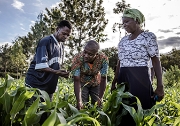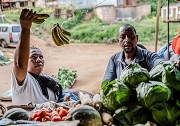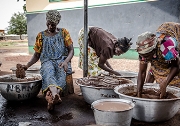Project overview
The three year-long EUR 9 million project ‟Support towards operationalization of the SADC Regional Agricultural Policy” (STOSAR) is financed by the European Union (EU) as part of its 11th Economic Development Fund Programme (EDF 11).
The programme has three components being implemented by the SADC Secretariat and the Food and Agriculture Organization of the United Nations (FAO), which are:
- enhancing information on agricultural production, sustainability and competitiveness for evidence-based decision-making;
- improving access to markets through implementation of plant and animal pest and disease control strategies at regional level;
- facilitating implementation of some components of Regional Food and Nutrition Security Strategy (FNSS). The latter component is being implemented directly by the SADC Secretariat.
Background
By investing in domestic agri-food systems, which promotes economic growth and sustainable food production, Member States of the Southern African Development Community (SADC) are leveraging on the benefits of regional value chains, access to international markets and pooling of resources to achieve economies of scale.
To facilitate regional cooperation and integration, the SADC has come up with a Regional Agricultural Policy (RAP) which provides a framework of common objectives designed to harmonize, and create synergies between the agricultural sectors of its Member States, and, in so doing, strengthening regional integration, sustainable agricultural growth and socio-economic development.
The SADC Council of Ministers approved the SADC Regional Agricultural Policy (RAP) and the SADC Regional Agricultural Policy Investment Plan (RAIP) in June 2013 and July 2016 respectively.
The RAIP, which set out to operationalize the RAP, was prepared in the context of the Comprehensive African Agriculture Development Programme (CAADP), which was established in Maputo in 2003 as a pan-African policy framework to transform agriculture, create wealth, improve food security and nutrition and promote inclusive economic growth.
This project forms part of the 11th EDF Regional Indicative Programme (RIP) identified under the SADC region envelope in line with the 11th EDF 2014 - 2020 Regional Indicative Programme for Eastern Africa, Southern Africa and the Indian Ocean. The overall objective of this action is to accelerate progress towards implementation of SADC regional integration.
The EU and SADC Secretariat identified FAO as the lead implementing agency for two components of the Support Towards the Operationalization of the SADC Regional Agricultural Policy Project (STOSAR).
Project beneficiaries

SADC Member State Governments, Civil Society Organizations, Farmers’ Associations, individual farmers, consumers and rural populations, including Marginalized communities and disabled people in the SADC region will benefit from increased coherence of evidence-based regional and national policies, strategies and capacities.

Rural communities, women and youths in particular, will benefit substantially as they provide the largest labour force in the agricultural sector and represent the majority of the poor.

Women headed households and children (vulnerable populations) will be the primary beneficiaries from greater coherence and evidence-based decision-making to respond, mitigate and reduce impacts of animal diseases and plant pests that undermine food and nutrition security, livelihoods and overall resilience in the current era of climate change and climate related threats.
Project partners
To strengthen regional coordination and collaboration, build partnerships, and ensure sustainability of project results, FAO engaged five centres of excellence from the SADC region to provide technical assistance. Implementing entities include:






